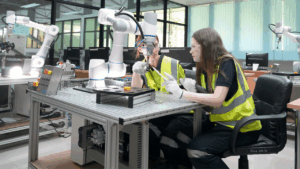An original CTV News article, by writer Melissa Lopez-Martinez
Amid efforts to meet global emissions targets, economies across the world, especially in Canada, are experiencing an shift to expand jobs within the environmental sector.
The need to fill jobs within clean energy have become more of a necessity in order to meet global emissions targets set by the 2015 Paris Agreement.
A United Nations report released this week said electricity supply from clean energy sources needs to double within the next eight years if the world aims to stay under the goal of 1.5°C of warming temperatures.
The director of research at ECO Canada, Geni Peters, says this green transition is exactly what’s on the rise whether companies have a focus on clean energy or not.
“I think one thing that also has come up is that the economy as a whole is slowly greening. So, regardless of what sector a worker is employed in, they’re going to find that they’re going to be increasing requirements for them to be familiar with environmental regulations and policies,” Peters said in a phone interview with CTVNews.ca on Wednesday.
Peters said a new job emerging from efforts to boost the green economy are energy advisors, which involves consulting large companies in tech, construction or engineering on how to manage energy use.
“We have very high demand for energy advisors across Canada to help us determine what level of energy efficiency our current building stock will have so that we can then improve upon that, reduce our energy usage in the building sector and improve our carbon footprint,” she said.
According to ECO Canada’s labour outlook, 1 in 26 Canadian workers had a green job and the environmental sector workforce increased by 5 per cent in 2020. By 2025, job growth and retirement will account for an estimated 173,000 net environmental job openings.
A 2021 report by Clean Energy Canada estimates by 2030, there will be 639,200 jobs within the clean energy field, an increase of nearly 50 per cent compared to 2020 when 430,500 jobs were reported.
Among the fastest growing industries within clean energy, electric vehicle technology is expected to increase by 39 per cent per year. Sarah Miller, research associate at the Canadian Climate Institute, said these jobs within technology and the electrical field are among the sectors that can expect economic opportunity with the shift to cleaner energy.
“Sectors that see significant economic opportunity include, low carbon electricity, building technology, battery, storage, biofuels; all those sorts of sectors could benefit from the shift to net-zero,” Miller said in a phone interview on Wednesday.
Several jobs have become gravely hit by the overall impacts of climate change like extreme weather events and rising temperatures. However, Miller says there is still hope for these sectors like construction and agriculture who could see some benefits.
“We see construction benefiting from increasing climate impacts because of the need to repair and replace damaged infrastructure prematurely,” Sara Miller, research associate at the Canadian Climate Institute said.
BRIDGING THE EDUCATION GAP
While environmental jobs will see an increased need in the future, the educational opportunities may not be meeting the demand for workers without the right skills to enter the roles, Miller said.
“We still need to see much more investment and more policy detail on workforce transition and workforce readiness,” she said.
The federal government has previously funded and created programs to create more jobs in the environmental workforce. Just this week, Prime Minister Justin Trudeau announced an investment of $222 million for a Quebec mineral company to increase production on lithium, titanium, and scandium; minerals found in electric vehicles and batteries.
Nonetheless, Peters said there needs to be more investment in educational programs to set up Canadians who might be ready to work in the environmental sector but who don’t have all the skills they need.
Among the obstacles, some workers require transitional help if they’re shifting careers and need help transferring their skills. Others who do have knowledge on environmental sciences or policies, for example, might not have the management skills to lead large teams.
Peters says by providing these workers with proper training through accessible co-op programs, can over time aid in smoothing Canada’s green transition.
“It’s not a short term fix but it is something that the government is aware of that building these pathways and providing smoother transitions from non-environmental roles to environmental roles is going to be really critical to meet our objectives,” Peters said.





